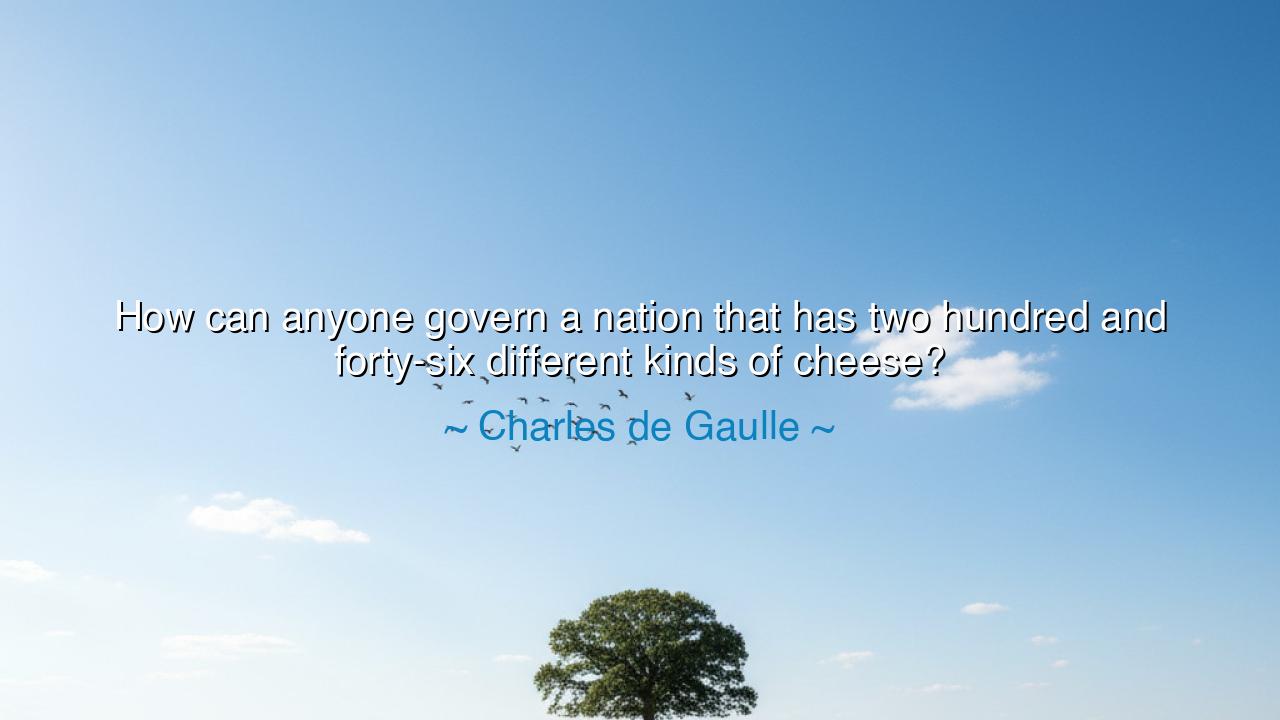
How can anyone govern a nation that has two hundred and forty-six
How can anyone govern a nation that has two hundred and forty-six different kinds of cheese?






When Charles de Gaulle uttered the wry and weary words, “How can anyone govern a nation that has two hundred and forty-six different kinds of cheese?”, he was not speaking merely of dairy but of diversity—the wild, unruly, magnificent complexity of his homeland, France. Beneath the humor of the statement lies a profound reflection on the challenge of leadership in a society bursting with individualism, taste, and spirit. De Gaulle, a soldier, statesman, and savior of his nation in its darkest hour, knew that unity cannot be imposed—it must be inspired. His quote, delivered with both affection and frustration, captures the eternal paradox of freedom: that a nation rich in differences is glorious, but never easy to rule.
To understand the heart of this saying, one must look into the France of the mid-twentieth century, a land scarred by war yet fiercely alive with opinions, passions, and peculiarities. Every province had its customs, its dialects, its cheeses—each a symbol of local pride. For de Gaulle, this was both the beauty and the burden of governance. A nation that boasts hundreds of cheeses is not just gastronomically diverse—it is politically, culturally, and spiritually diverse. Each citizen, like each cheese, has a flavor, a temperament, a tradition that cannot be melted easily into one uniform mold. To govern such a people, he implied, is to embrace contradiction itself—to balance unity with individuality, and order with freedom.
De Gaulle’s quip arose from the exhaustion of leading France through postwar reconstruction and the birth of the Fifth Republic. He had faced Communists and conservatives, farmers and intellectuals, monarchists and modernists—all pulling in different directions, each believing their own vision was the soul of the nation. In such chaos, his remark was both lament and praise. He was saying, in essence: “This is what makes us French—our differences, our defiance, our refusal to be one flavor.” It was not despair that fueled his words, but the resigned wisdom of a man who knew that democracy means governing the ungovernable.
Consider also the wider truth hidden within his humor. Throughout history, the greatest leaders—from Abraham Lincoln to Nelson Mandela—have grappled with the same dilemma: how to forge harmony among countless voices. Lincoln presided over a nation divided by slavery and ideology; Mandela over a land fractured by race and resentment. Both knew that to rule over diversity is not to silence it but to give it room to breathe. Like de Gaulle, they understood that the art of leadership is not domination, but orchestration—turning many melodies into one symphony.
Yet de Gaulle’s metaphor of cheese carries even deeper meaning. For cheese is born of fermentation—of patience, of transformation, of accepting decay as part of creation. So too is a nation. It ripens through struggle, through time, through the mingling of many elements. To govern such a nation requires humility before its living complexity. The ruler who seeks uniformity will end with stagnation; the one who embraces diversity will nourish vitality. Thus, de Gaulle’s jest becomes a philosophy: that true leadership lies not in forcing sameness, but in channeling difference toward a shared destiny.
In modern times, this lesson has grown ever more urgent. The world today is a tapestry of identities, beliefs, and desires. To govern—or even to live harmoniously—within it demands the same wisdom de Gaulle displayed: humor to bear frustration, respect for individuality, and vision to unite without erasing. The societies that fail to honor diversity crumble under the weight of division; those that celebrate it without direction dissolve into chaos. The balance, delicate as aged cheese, lies in cultivating both freedom and purpose.
Therefore, the old general’s words, though wrapped in jest, conceal the gravity of a statesman’s truth. “How can anyone govern a nation that has two hundred and forty-six kinds of cheese?” he asked—not to complain, but to remind us that governing humanity is no less complex than governing France. Where there is richness of spirit, there will always be resistance to conformity. And that, perhaps, is the price of civilization itself.
So, what lesson can we draw? Cherish your diversity, but never let it fragment your common purpose. In your own life, whether leading a family, a team, or a community, learn from de Gaulle’s wisdom: do not seek to erase differences—seek to harmonize them. Accept that leadership is not command but communion. And remember, as de Gaulle knew well, that the nation—or the soul—that has “two hundred and forty-six kinds of cheese” is not ungovernable. It is simply alive.






AAdministratorAdministrator
Welcome, honored guests. Please leave a comment, we will respond soon